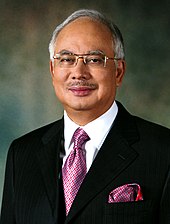
MALAYSIA
PERLIS WILAYAH PERSEKUTUAN KUALA LUMPUR


Malaysia is a federal constitutional monarchy located in Southeast Asia. It consists of thirteen states and three federal territories and has a total landmass of 329,847 square kilometres (127,350 sq mi) separated by the South China Sea into two similarly sized regions, Peninsular Malaysia and East Malaysia (Malaysian Borneo). Peninsular Malaysia shares a land and maritime border with Thailand and maritime borders with Singapore, Vietnam, and Indonesia. East Malaysia shares land and maritime borders with Brunei and Indonesia and a maritime border with the Philippines. The capital city is Kuala Lumpur, while Putrajaya is the seat of the federal government. In 2010 the population was 28.33 million, with 22.6 million living in Peninsular he country is multi-ethnic and multi-cultural, which plays a large role in politics. The constitution declares Islam the state religion while protecting freedom of religion. The government system is closely modelled on the Westminster parliamentary system and the legal system is based on common law. The head of state is the king, known as the Yang di-Pertuan Agong. He is an elected monarch chosen from the hereditary rulers of the nine Malay states every five years. The head of government is the Prime Minister.
Since independence, Malaysia has had one of the best economic records in Asia, with GDP growing at an average 6.5% per annum for almost 50 years. The economy has traditionally been fueled by its natural resources, but is expanding in the sectors of science, tourism, commerce and medical tourism. Today, Malaysia has a newly industrialised market economy, ranked third largest in Southeast Asia and 29th largest in the world. It is a founding member of the Association of Southeast Asian Nations, the East Asia Summit and the Organisation of Islamic Cooperation, and a member of Asia-Pacific Economic Cooperation, the Commonwealth of Nations, and the Non-Aligned Movement.
Malaysia is a federal constitutional elective monarchy. The system of government is closely modelled on that of the Westminster parliamentary system, a legacy of British colonial rule. The head of state is the Yang di-Pertuan Agong, commonly referred to as the King. The King is elected to a five-year term by and from among the nine hereditary rulers of the Malay states; the other four states, which have titular Governors, do not participate in the selection. By informal agreement the position is systematically rotated among the nine, and has been held by Abdul Halim of Kedah since December 2011. The King's role has been largely ceremonial since changes to the constitution in 1994, picking ministers and members of the upper house.
Legislative power is divided between federal and state legislatures. The bicameral federal parliament consists of the lower house, the House of Representatives and the upper house, the Senate. The 222-member House of Representatives is elected for a maximum term of five years from single-member constituencies. All 70 senators sit for three-year terms; 26 are elected by the 13 state assemblies, and the remaining 44 are appointed by the King upon the Prime Minister's recommendation.The parliament follows a multi-party system and the government is elected through a first-past-the-post system. Since independence Malaysia has been governed by a multi-party coalition known as the Barisan Nasional
Each state has a unicameral State Legislative Assembly whose members are elected from single-member constituencies. State governments are led by Chief Ministers, who are state assembly members from the majority party in the assembly. In each of the states with a hereditary ruler, the Chief Minister is normally required to be a Malay, appointed by the ruler upon the recommendation of the Prime Minister. Parliamentary elections are held at least once every five years, the most recent of which took place in May 2013. Registered voters of age 21 and above may vote for the members of the House of Representatives and, in most of the states, for the state legislative chamber. Voting is not mandatory. Except for state elections in Sarawak, by convention state elections are held concurrently with the federal election.

Executive power is vested in the Cabinet, led by the Prime Minister. The prime minister must be a member of the house of representatives, who in the opinion of the King, commands a majority in parliament. The cabinet is chosen from members of both houses of Parliament. The Prime Minister is both the head of cabinet and the head of government. The incumbent, Najib Razak, appointed in 2009, is the sixth prime minister.
Malaysia's legal system is based on English Common Law.Although the judiciary is theoretically independent, its independence has been called into question and the appointment of judges lacks accountability and transparency.The highest court in the judicial system is the Federal Court, followed by the Court of Appeal and two high courts, one for Peninsular Malaysia and one for East Malaysia. Malaysia also has a special court to hear cases brought by or against Royalty. Separate from the civil courts are the Syariah Courts, which apply Shariah law to cases which involve Malaysian Muslims[ and run parallel to the secular court system.[The death penalty is in use for crimes such as murder, terrorism and drug trafficking
Race is a significant force in politics, and many political parties are ethnically based. Affirmative actions such as the New Economic Policy and the National Development Policy which superseded it, were implemented to advance the standing of the bumiputera, consisting of Malays and the indigenous tribes who are considered the original inhabitants of Malaysia, over non-bumiputera such as Malaysian Chinese and Malaysian Indians. These policies provide preferential treatment to bumiputera in employment, education, scholarships, business, and access to cheaper housing and assisted savings. However, it has generated greater interethnic resentment.[There is ongoing debate over whether the laws and society of Malaysia should reflect secular or Islamic principles. Islamic laws passed by the Pan-Malaysian Islamic Party in state legislative assemblies have been blocked by the federal government.